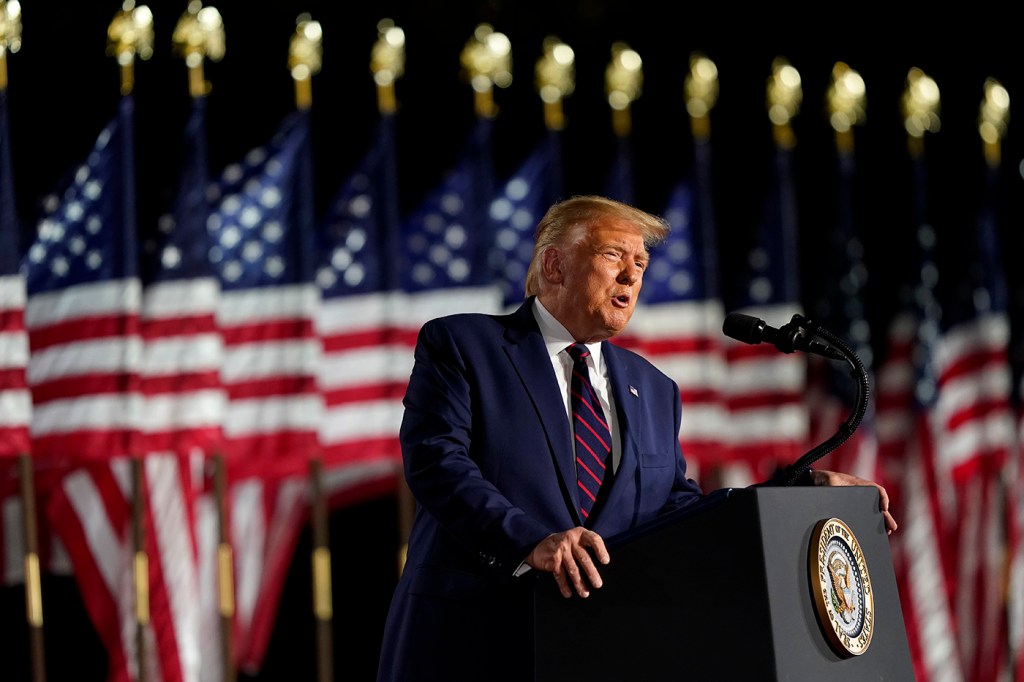Trump’s pandemic approval ratings rise for the first time, new national study finds

For the first time since April, President Donald J. Trump’s approval ratings for his handling of the coronavirus appear to have stopped falling and even rose slightly, suggesting he has turned a corner for the time being, according to new findings by researchers from Northeastern, Harvard, Northwestern and Rutgers.
The president’s pandemic approval numbers have hovered in the low 30s since the researchers began tracking them earlier in the year. But the sixth in a rolling series of national surveys taken Aug. 7-26 showed a slight uptick to 35 percent.
“It is more than a statistical anomaly because he was definitely going down every month before this,” says David Lazer, university distinguished professor of political science and computer and information sciences at Northeastern, and one of the researchers who conducted the study.
“We can say with confidence that he did not go down and that given the size of our sample, he probably did go up slightly.”

David Lazer is university distinguished professor of political science and computer and information sciences with joint appointments in the College of Social Sciences and Humanities and the Khoury College of Computer Sciences at Northeastern. Photo by Adam Glanzman/Northeastern University
The survey of 21,000 U.S. residents was not entirely positive news for the president. In the battleground state of Florida, with its 29 Electoral College votes, support for Trump’s management of the COVID-19 health crisis fell ten points to 29 percent in late August. It had been as high as 42 percent in late April.
Florida has more than 646,000 cases and nearly 12,000 deaths, according to the latest information.
The survey showed similar double-digit drops in support in other states Trump won in 2016, including Georgia, Kentucky, North Carolina, and Ohio.
Further findings show mixed political news for Democrats and Republicans.
Republican governors in five states continued to receive high marks from both Democrats and Republicans for aggressive leadership efforts to stem the spread of SARS CoV-2, the coronavirus that causes COVID-19.
Maryland’s Larry Hogan, Massachusetts’s Charlie Baker, Vermont’s Phil Scott, Ohio’s Mike DeWine and New Hampshire’s Chris Sununu were perceived on both sides of the political aisle as performing better than other state leaders.
Except for Massachusetts, the four other states have fewer than 9,000 pandemic-caused deaths combined, a fraction of the more than 188,000 U.S. deaths total.
The findings suggest that perception of the governors’ responses to the coronavirus transcends partisan politics.
“It’s certainly surprising that you have these Republicans in these five states who have higher approvals among Democrats than among Republicans,” says Lazer. “In this age of political polarization, that’s truly a shocker.”
The remaining 21 states with GOP chief executives, however, is a different story. Approval is deeply polarized, at 64 percent among Republicans (a drop of 13 points since April), and 25 percent among Democrats (down 22 points), according to the survey. Bifurcation was across the board in places like Alaska, Wyoming, Tennessee, Iowa, and Texas.
There was also deep dissatisfaction with the leaders of two highly populous states, California and Florida. Democrat Gavin Newsom dropped from 58 percent approval to 47 percent, respectively, while Republican Ron DeSantis fell from an already low 40 percent to 29 percent.
Another precipitous drop in support was for Virginia’s Ralph Northam, who saw his numbers slide from 59 percent to 46 percent.
“Part of what happened in California was they were initially seen as a big success story and then they dropped the ball,” explains Lazer. “Whereas in Florida, the story has been more that the governor has been relatively less aggressive. It will be interesting to see how it unfolds over the next month because Florida put a lot of pressure on schools to reopen.”
COVID-19 will likely loom as large over the November elections as the state of the economy, Lazer predicts. And with the court of public opinion largely laying blame at the president’s feet for initially mismanaging the health crisis, it appears as if his slumping approval ratings have stopped their free fall.
“This is the first survey where his numbers have stayed steady or gone up,” he said. “In April the president was performing worse than every single governor. His approval ratings are down since then, but there are a handful of governors who have dropped even more, which means he is performing a bit better than a few governors now.
“His approval ratings for his handling of COVID-19 are still extremely low, but a lot can happen between now and the election.”
For media inquiries, please contact media@northeastern.edu.





